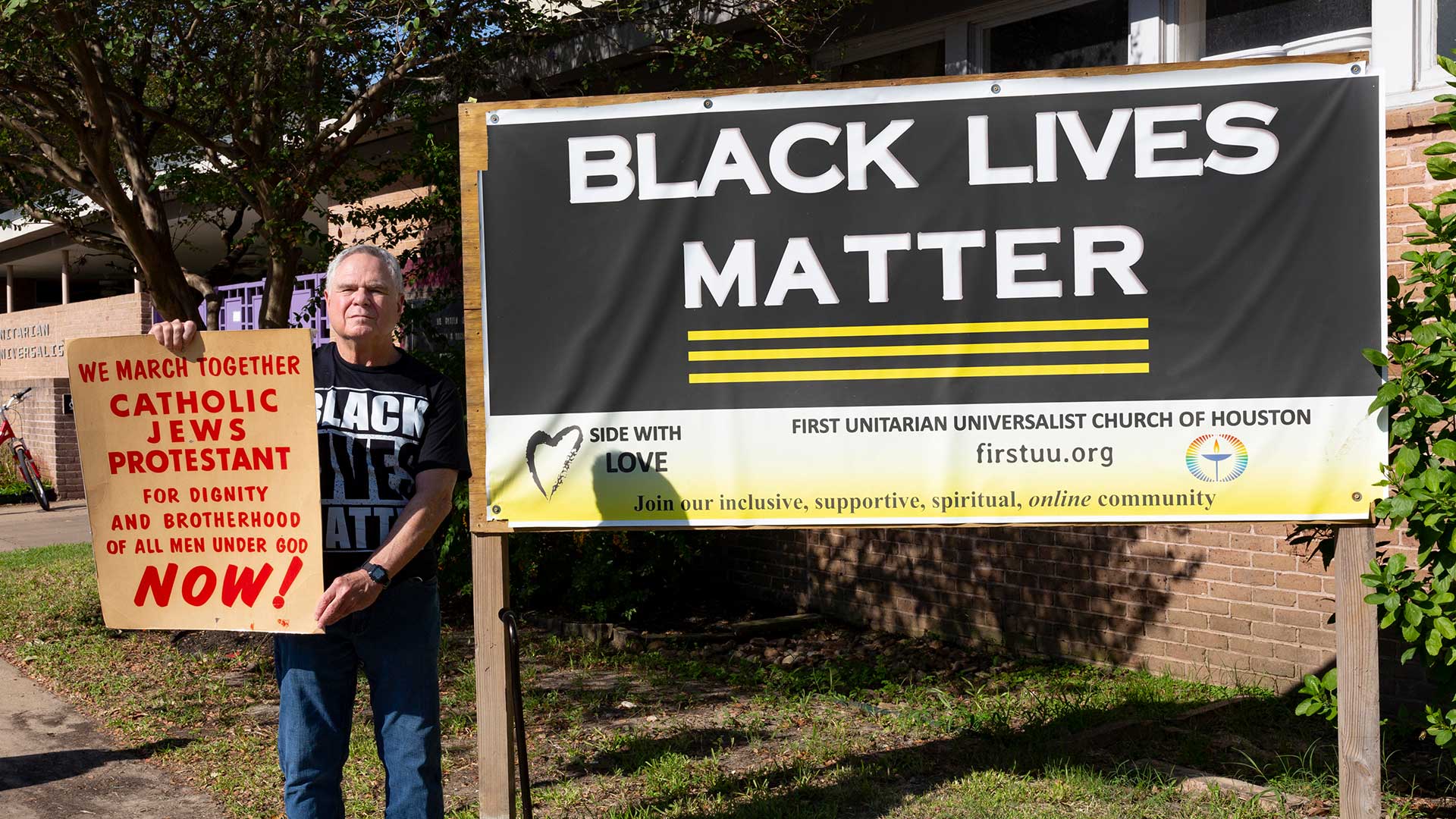- Future Students
- How to Apply
- Visit UHCL
- Admitted Students
- Tuition, Costs and Aid
- Degrees and Programs
- Contact Admissions
- Current Students
- Class Schedule
- Academic Calendar
- Advising
- Events
- Library
- Academic Resources and Support
- Student Services and Resources
- Alumni
- Lifetime Membership
- Alumni Events
- Update Your information
- Awards and Recognitions
- Give to UHCL
Retired UHCL prof continues legacy of protest for racial justice
October 9, 2020 | UHCL Staff

When Rep. John Lewis, who spent his life as an organizer and social justice activist, said that people should get into “good trouble,” Craig Oettinger was listening.
Oettinger, who retired as an associate professor of sociology from University of Houston-Clear Lake in 2010, said he spent his youth and college life in Connecticut participating in community organizations and protesting for social justice. He had learned from personal experience what it was to be the object of racial intolerance.
“I am Jewish, and when I went to high school, I was the only Jewish person in the whole school,” he said. “I found out quickly that my being Jewish mattered a lot to some of the students and teachers. Someone drew a swastika on the restroom wall. It was very clear to me that some people didn’t like me.”
Oettinger’s mother heard about the formation of a new community organization focused on racial injustice and she let him go. “I was 10 years younger than nearly everyone, and most of the members were Black ministers,” he remembered. “Through that organization, I got involved with a movement that wanted the mayor to guarantee that some apartments, built after a block of rundown houses inhabited by Black citizens had been torn down, should be subsidized for those who no longer had a place to live.”
He said he’d gone repeatedly with the group to the mayor’s office, and they eventually started a sit-in. “They wouldn’t leave until the mayor signed an agreement that the rents would be subsidized. The police were called,” he said. “They were rough with us, and they took us to jail.”
The jail cell was packed with many more people than it was equipped to handle, Oettinger said, with only a bucket for a toilet in the corner. “Men were dressed in suits and the women wore dresses,” he said. “One of the men removed his shirt and tore his undershirt into pieces for toilet paper. Everyone faced away from the person using the bucket so they could have privacy. That’s when I first learned that some people could create dignity in a situation that was not dignified.”
Their cell was in view of an upstairs balcony in the jailhouse. “The police urinated on us from that balcony,” he said. “The newspaper had gotten involved and the mayor was upset about the publicity. He suddenly agreed to our demands and said none of this would have happened if we hadn’t been so impatient. I had just been carried along in all of this, but it had a huge impact on me.”
This is why, he said, he went to Washington, D.C. on Aug. 28, 1963, to participate in the March on Washington, where Martin Luther King, Jr. delivered his historic “I Have a Dream” speech. “I was a mile away in a train station and everyone turned on their radio. I saw the way his words stopped 20,000 people in their tracks.”
He said it was his participation in sit-ins, protests and racial and anti-war community organizations that caused him to apply to the doctoral sociology program at Brown University.
In June, when Houston citizens rallied to protest police brutality after the murder of George Floyd, Oettinger said his health prevented him from walking the rally route. But that did not stop him from protesting. Every single morning, he holds a sign on the corner of Fannin and Southmore in the Houston Museum District. He said he hopes to inspire people with conservative values to know racism is still an issue.
“My sign says, ‘Racism is also a pandemic,’” he said. “Along with some other members of First Unitarian Universalist Church who come after I leave, I am out there by myself every morning from about 6-8 a.m.”
He has eight different signs he lends people — including the one he took to the March on Washington back in 1963. “That one says, ‘We March Together — Catholics, Jews, Protestants — For the Dignity and Brotherhood of All Men Under God NOW!’” he said. “If someone wants to borrow one, they can.”
Oettinger’s efforts have been covered by local media, but his protest has continued long after the cameras left. He said he doesn’t miss a morning holding his sign, and he’ll keep reminding people that racial justice matters. Because, as Rep. Lewis said, “When you see something that is not right, not fair, not just, you have to speak up. You have to say something; you have to do something.”
UHCL’s Sociology program offers courses in medical sociology, race and class inequality, social stratification and more to prepare students to pursue a wide variety of career paths.






